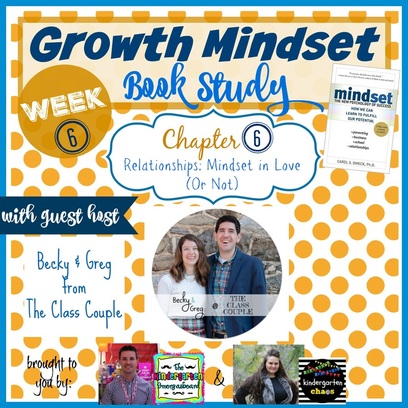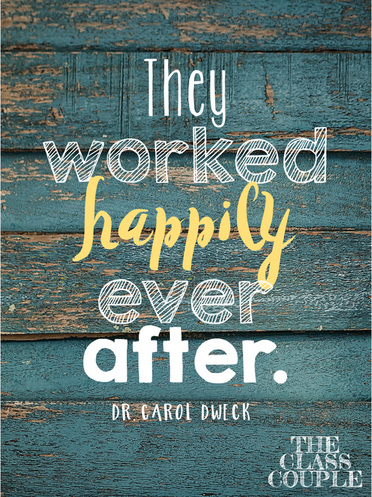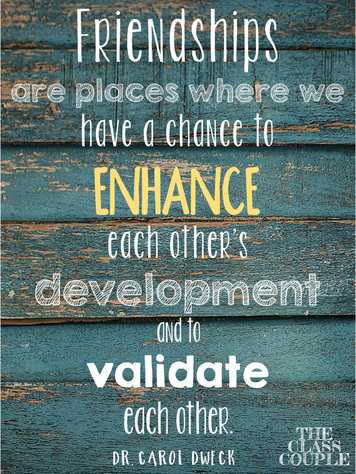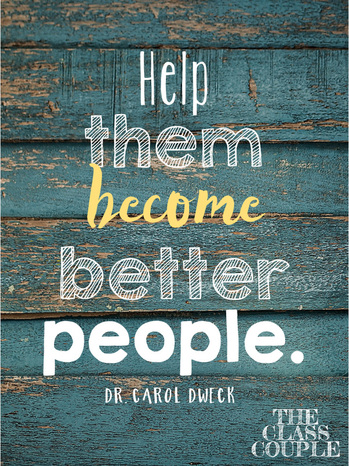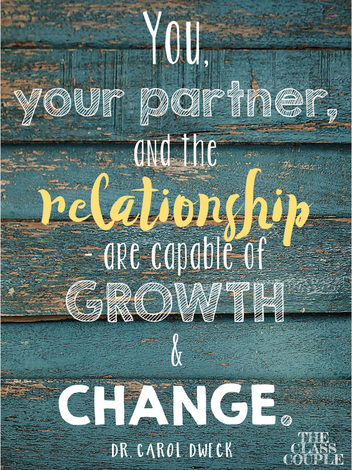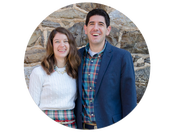|
Greg and I met in college, were friends for a year, and then began dating. Throughout our college years, everything was easy and just seemed meant to be. (We also didn’t really have a care in the world when it came to “adult stuff”) Once we got married, bought a house, started grad school, and started a swim team, real life set in and we realized that if we wanted our relationship to be a healthy one, we needed to put time and effort into it. We needed to share our frustrations (in a nice tone and perhaps with a glass of wine), we needed to make time for each other, and we needed to support one another’s endeavors. After reading Dweck’s chapter on Relationships, it was easy to where our mindsets were and how we could continue to grow. Many of the previous posts do a great job of describing the fixed and growth mindsets. It is easy to see how those same definitions correlate to the growth and fixed mindset when referring to relationships. Dweck explains that individuals with a fixed mindset believe that relationships are either meant to be, or not. If the partner could not read the other’s mind, or “just know” what the other person wanted/liked/disliked, then the relationship was doomed! Individuals with a fixed mindset also wanted revenge on the other person, especially after the relationship failed. If you can't tell by now, this is one of the most unhealthy ways of thinking when it comes to relationships. However, individuals with the growth mindset view the relationship as ever-changing and evolving. They believe that they must support their partner, and work together to not only grow the relationship, but also grow each other in whatever aspirations they may have. This has been so important in our relationship. Early on in our marriage, Greg started a swim team at his high school and became the head coach of the team. Coaching is a huge time commitment, and it seemed as if the swim season was the longest season of the year, but I whole heartedly supported him for years in this role. Years later, when I was excited, but hesitant with the idea of starting a Teachers Pay Teachers store, Greg was the one supporting me and giving me the courage to give it a try. He later willingly came along for the ride! While relationships require many things, one of the biggest and most important is the work both partners put in to it with support of one another, and of the relationship. Dweck’s focus on romantic relationships can also be applied to friendships. Friends should also be there to encourage and support you, happily giving you the limelight when you deserve it (and vice versa). Dweck also touches on those friends we may have that revel in our misfortune, and feel better about themselves when they believe that they have the upper hand. (Regardless, we carry these people as our friends.) And while we all have an idea of who we would turn to in a time of need, Dweck posed an interesting question: "Who we would go to when good things happen?” Those are the friends (with growth mindsets) who will always be there - No. Matter. What. When placed in a more competitive setting, like the workplace, we tend to push Dweck’s considerations to the side. It’s easy to close the door to our classroom, delete an all staff email about a new opportunity, or disregard how other professionals might be enhancing the learning experience in their classroom. That’s the “Here we go, again” mentality. It’s fixed mindset in the first degree. Dweck believes we need to foster meaningful relationships with our coworkers to better serve our students. We need to model the behavior in the hope that our students will improve their ability to see positive qualities in others. Honestly, it’s a chilling part of the chapter because Dweck’s focus shifts to growth and fixed mindset in kids (students). Students bring a lot of baggage with them. This can make or break the classroom dynamic, but most often it’s not at fault of our learners. Their life experiences - whether 6 or 16 - has programmed their mindset to accept and grow as a person or, conversely, built barriers to individual growth. Dweck recognizes this as an opportunity for educators to help these kids grow as individuals, not just students. Easier said than done in today’s educational climate, but those are the real chances for growth in our classroom. Whether it’s the vulnerable bully, or an innocent victim, everyone can benefit from our ability to create an accepting culture. Dweck’s premise is that we need to carry a growth mindset to become stronger individuals - regardless of the endeavor. Those around us also hold that same decision - growth or fixed. Relationships, however, are fickle. They can only thrive with the combined efforts of both individuals. Each person needs to see the value and potential in their partner for the relationship to develop. No doubt - that can be hard work. It only takes the right mindset. Thanks to Greg and Abbie for including us in the Growth Mindset Summer Book Study! We were excited to share our reflections on Chapter 6 because of its focus on relationships and how our mindsets effect them. It pushed us to reflect on ourselves and our own relationship.
2 Comments
Rosemary
8/8/2020 09:07:15 am
I would Love some hell, my husband is an Alpha Male. And is considering leaving.
Reply
11/16/2023 02:29:07 am
Conquer pixels, command victory! Join the online gaming revolution.
Reply
Leave a Reply. |
Mr. & Mrs.We are Becky and Greg from York, PA. Becky just started her 13th year of teaching first grade. Greg is a high school social studies teacher. We love teaching and this blog is a peek into our world. the library
June 2019
tag, you're it!
All
subscribe Blog Design by Alexis Sanchez © |
